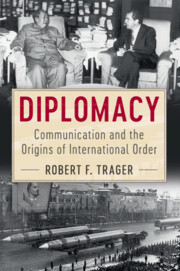Book contents
- Frontmatter
- Dedication
- Contents
- List of Figures
- List of Tables
- Preface
- 1 Can Adversaries Communicate?
- 2 How Perceptions of Intentions Form
- PART I THEORY
- PART II EMPIRICAL ANALYSIS
- APPENDICES
- Appendix A Proofs for Chapters 3–6
- Appendix B The Inference Dataset
- Appendix C Demands, Offers, and Assurances Dataset
- Appendix D German Inferences Prior to World War II
- References
- Index
Appendix C - Demands, Offers, and Assurances Dataset
from APPENDICES
Published online by Cambridge University Press: 25 October 2017
- Frontmatter
- Dedication
- Contents
- List of Figures
- List of Tables
- Preface
- 1 Can Adversaries Communicate?
- 2 How Perceptions of Intentions Form
- PART I THEORY
- PART II EMPIRICAL ANALYSIS
- APPENDICES
- Appendix A Proofs for Chapters 3–6
- Appendix B The Inference Dataset
- Appendix C Demands, Offers, and Assurances Dataset
- Appendix D German Inferences Prior to World War II
- References
- Index
Summary
The data comprise all demands, offers, and assurances that occurred between 1900 and the start of the World War in 1914 that are noted in the British Confidential Print and (1) were made by European great powers other than Britain to European great powers and (2) were classified as “security-related.” The European great powers of the day were: Austria–Hungary, France, Germany, Great Britain, and Russia. If the British were not witness to a demand, offer, or assurance (hereafter a TOA) by another power to a third power, but the British took it for granted that a TOA had occurred, this was also coded. TOAs from a great power to a non-great power were also coded if observers took it for granted that the non-great power was so closely connected to a great power that the TOA was equally made to that great power. TOAs were classified as “security-related” if they concerned relative power, decisions about the use of force, alliance politics or influence or control over territory. TOAs about economic matters were also included when these were presented as affecting security concerns. If precisely the same TOA was made on multiple occasions, the first instance was coded as an observation and the total number of identical TOAs was listed as a variable.
A full codebook is available on the author's website, but I shall note how certain variables were coded here. TOAs were classified as demands when the proposal was known to be against the preference of the state to which the statement was made and as offers otherwise. If an inference was made as a result of a TOA, this was coded in the same observation and categorized in a number of different ways that allow for the variety of distinctions drawn in the text. The Inference Certainty variable was coded either 1, 2, or 3, based on the words used in the drawing of the inference as follows:
1 Words such as “might,” “may,” and “possibly.” Examples of specific phrases that merited this coding include: “if a Great Power motions for disarmament, Germany might suggest that armaments be proportional to a country's population,” and “If Russia were to meet Austria's wishes in this matter it might dispose her to yield on the question of Djakova.”
- Type
- Chapter
- Information
- DiplomacyCommunication and the Origins of International Order, pp. 261 - 262Publisher: Cambridge University PressPrint publication year: 2017



